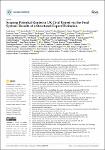Scoping Potential Routes to UK Civil Unrest via the Food System: Results of a Structured Expert Elicitation
| dc.contributor.author | Jones, A | |
| dc.contributor.author | Bridle, S | |
| dc.contributor.author | Denby, K | |
| dc.contributor.author | Bhunoo, R | |
| dc.contributor.author | Morton, D | |
| dc.contributor.author | Stanborough, L | |
| dc.contributor.author | Coupe, B | |
| dc.contributor.author | Pilley, V | |
| dc.contributor.author | Benton, T | |
| dc.contributor.author | Faloon, P | |
| dc.contributor.author | Matthews, T | |
| dc.contributor.author | Pettinger, C | |
| dc.date.accessioned | 2023-10-12T10:25:31Z | |
| dc.date.available | 2023-10-12T10:25:31Z | |
| dc.date.issued | 2023-10-12 | |
| dc.identifier.issn | 1937-0709 | |
| dc.identifier.issn | 2071-1050 | |
| dc.identifier.other | 14783 | |
| dc.identifier.uri | https://pearl.plymouth.ac.uk/handle/10026.1/21383 | |
| dc.description.abstract |
We report the results of a structured expert elicitation to identify the most likely types of potential food system disruption scenarios for the UK, focusing on routes to civil unrest. We take a backcasting approach by defining as an end-point a societal event in which 1 in 2000 people have been injured in the UK, which 40% of experts rated as “Possible (20–50%)”, “More likely than not (50–80%)” or “Very likely (>80%)” over the coming decade. Over a timeframe of 50 years, this increased to 80% of experts. The experts considered two food system scenarios and ranked their plausibility of contributing to the given societal scenario. For a timescale of 10 years, the majority identified a food distribution problem as the most likely. Over a timescale of 50 years, the experts were more evenly split between the two scenarios, but over half thought the most likely route to civil unrest would be a lack of total food in the UK. However, the experts stressed that the various causes of food system disruption are interconnected and can create cascading risks, highlighting the importance of a systems approach. We encourage food system stakeholders to use these results in their risk planning and recommend future work to support prevention, preparedness, response and recovery planning. | |
| dc.format.extent | 14783-14783 | |
| dc.language | en | |
| dc.publisher | Mary Ann Liebert | |
| dc.subject | food systems | |
| dc.subject | global catastrophic risk | |
| dc.subject | climate change | |
| dc.subject | extreme weather | |
| dc.subject | ecological collapse | |
| dc.subject | scenarios | |
| dc.subject | cascading risks | |
| dc.title | Scoping Potential Routes to UK Civil Unrest via the Food System: Results of a Structured Expert Elicitation | |
| dc.type | journal-article | |
| dc.type | Article | |
| plymouth.issue | 20 | |
| plymouth.volume | 15 | |
| plymouth.publication-status | Published online | |
| plymouth.journal | Sustainability | |
| dc.identifier.doi | 10.3390/su152014783 | |
| plymouth.organisational-group | |Plymouth | |
| plymouth.organisational-group | |Plymouth|Research Groups | |
| plymouth.organisational-group | |Plymouth|Faculty of Health | |
| plymouth.organisational-group | |Plymouth|Faculty of Health|School of Health Professions | |
| plymouth.organisational-group | |Plymouth|Research Groups|Institute of Health and Community | |
| plymouth.organisational-group | |Plymouth|REF 2021 Researchers by UoA | |
| plymouth.organisational-group | |Plymouth|Users by role | |
| plymouth.organisational-group | |Plymouth|Users by role|Academics | |
| plymouth.organisational-group | |Plymouth|REF 2021 Researchers by UoA|UoA03 Allied Health Professions, Dentistry, Nursing and Pharmacy | |
| dcterms.dateAccepted | 2023-10-08 | |
| dc.date.updated | 2023-10-12T10:25:31Z | |
| dc.rights.embargodate | 2023-10-13 | |
| dc.identifier.eissn | 2071-1050 | |
| dc.rights.embargoperiod | forever | |
| rioxxterms.versionofrecord | 10.3390/su152014783 |


